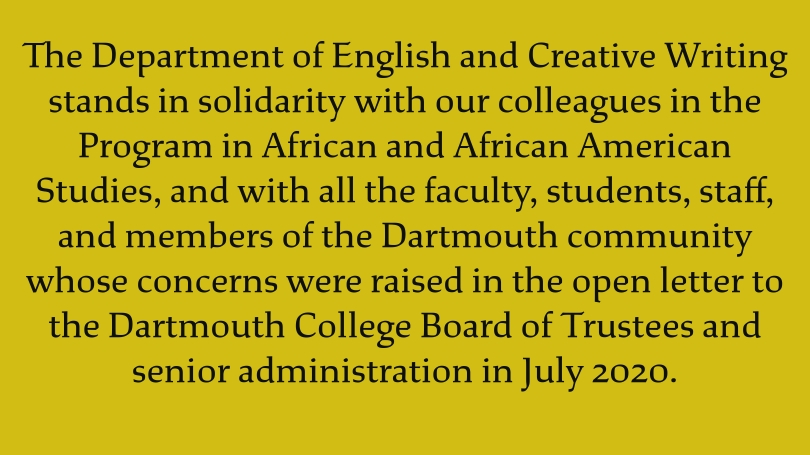
- Undergraduate
- Foreign Study
- Research
- News & Events
- People
Back to Top Nav
Back to Top Nav
Back to Top Nav
The faculty of the Department of English and Creative Writing stands in solidarity with colleagues in the Program in African and African American Studies, and with all the faculty, students, staff, alumni, and other members of the Dartmouth community whose concerns were raised in the open letter to the Board of Trustees of the College, President Hanlon, and members of the senior leadership team, dated July 14, 2020.
The urgency of these concerns cannot be overstated. As we draft this letter we find ourselves grappling with a number of interrelated national crises: a pandemic that has disproportionately affected Black and Latino communities and highlighted stark and systemic inequalities in the availability of health care; a draconian and inhumane approach to immigration policy that has resulted in violent family separations and deportations; White supremacy emboldened by increasingly authoritarian segments of the political establishment; and, perhaps most distressingly, ongoing police violence against unarmed Black people. It is with the urgency of these challenges in mind that we endeavor to respond to the concerns of our colleagues in African and African American Studies and beyond. "The final breaths of Breonna Taylor, Ahmaud Arbery, and George Floyd," they write, "have reinvigorated a movement and sparked a long-overdue reckoning with American White supremacy and anti-Blackness, twin organizing principles born in the European transatlantic slave trade. Through our current national conversation on race many Americans are, for the first time, carefully considering the collective impact of the relentless war their country has waged on Black people, at all scales and by all means available."
The longstanding connection between Black poetics, Black study, and Black protest on college and university campuses across the United States has helped to create space to address forms of violence and precarity. In 1967—the year before the student uprisings that would lead to the creation of the country's first Black Studies program—the poets Amiri Baraka and Sonia Sanchez began teaching on the campus of San Francisco State College, laying the groundwork for a vision of literary studies inextricable from the freedom dreams of Black human beings across the diaspora. The Department of English and Creative Writing at Dartmouth has always sought to engage with issues of race and justice. Yet we also need to acknowledge that the institutional history of English literary studies at Dartmouth has been partly shaped and sustained by deep-seated cultural prejudices that betray the Eurocentric origins of our discipline. As faculty in English and Creative Writing at Dartmouth, we believe that this current protest moment provides a unique opportunity for us to engage thoughtfully with the rethinking of literary studies announced by Baraka and Sanchez a full half century ago, and to understand the specific political, and pedagogical, demands it makes on all of us as writers and literary scholars. What we teach and how we teach must meet the urgency of the present situation and its call for a vision of our discipline that actively contributes to the arrival of a more just and equitable world. We are treating this moment as an opportunity for listening, and for making necessary improvements within the culture and structure of our own department, as well as an opportunity to branch out and build more vibrant and mutually supportive networks with our colleagues in other departments, in interdepartmental programs, and across the campus.
In their open letter to our campus and its leaders, our colleagues present a critical diagnosis of the pervasive structure of White supremacy on our campus. They urge all campus stakeholders to work actively in response to the current emergency, not least by thinking hard about the structural assumptions that ground our very disciplines. The faculty of the Department of English and Creative Writing endorse this position and accept this challenge. We are implementing the open letter's recommendations, while adding our voices to the demand that the College as a whole tackle these changes. Our action plan will include the following:
We recognize that the challenges ahead are significant and that short-term action and merely declarative statements won't address the underlying problems. We also realize that many of the most important changes recommended in the open letter require coordinated action across the College. We hope that the Department of English and Creative Writing can play its role in the realignment of campus culture and college-wide priorities that our colleagues have articulated. We see the intellectual diversity of our classrooms and our scholarly communities as a paramount strength and an enduring and urgent priority.